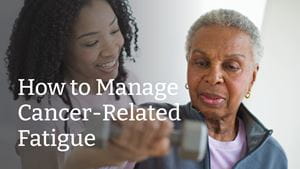
Cancer-related fatigue is one of the most common side effects of both cancer and its treatments. Affecting nearly 70% of all cancer patients, cancer-related fatigue is defined by the National Comprehensive Cancer Network as a “distressing, persistent, subjective sense of physical, emotional and/or cognitive tiredness or exhaustion related to cancer or cancer treatment that is not proportional to recent activity and interferes with usual function.”
“General fatigue is associated with feeling tired and usually occurs after bouts of increased activity. This type of fatigue can be resolved with adequate rest. Cancer-related fatigue, in contrast, is a higher intensity lack of energy that cannot be resolved by a good night’s sleep and can negatively impact a person’s mental health and quality of life”, says Vatsala Kirtani, MD, Hematologist/Medical Oncologist at Lipson Cancer Institute.
Many patients with cancer-related fatigue describe feeling tired, weak, not wanting to do things, not being able to concentrate, or feeling irritable.
Cancer-related fatigue most often affects patients who are undergoing chemotherapy, radiation therapy, bone marrow transplant, or immunotherapy (biologic therapy) but is also an early symptom noted by many patients at the initial diagnosis of cancer. It may last for many months or even years after a patient completes cancer treatments.
Other factors that can contribute to cancer-related fatigue include insomnia, anemia, depression, stress, medications, pain, hypothyroidism, and decreased nutrition.
Physical therapy and exercise are noted as highly effective, evidence-based treatments for CRF. “For years, cancer patients experiencing fatigue have been advised to rest and avoid any activity that may worsen their fatigue, but research has shown that activity actually can help improve their fatigue. Exercise also has been shown to increase endurance, improve strength, increase appetite and improve sleeping patterns”, says Deanna Hayden, PT. Deanna is a physical therapist who specializes in cancer-related fatigue therapy at Rochester Regional Health’s Physical Therapy & Rehabilitation Center at the Midtown Athletic Club.
The Rochester Regional Health Physical Therapy & Rehabilitation team and the Lipson Cancer Institute have collaboratively developed a treatment program for CRF, in which skilled physical and occupational therapists use a holistic approach to help counteract some of the effects of this condition.
And while it can’t be completely cured, CRF can be carefully managed with a few tips: